Trading With Bard



Many investors are looking to harness the power of AI tools, such as Google’s chatbot Bard, to enhance their online trading. In this guide to trading with Bard, we assess its capabilities as well as its risks. We also look at Bard vs ChatGPT, plus the alternative AI solutions offered by leading brokers.
Google’s Bard was not designed for online trading. It is in the ‘experimental phase’ where the quality and accuracy of its outputs are mixed.
Instead, several trustworthy brokers offer AI tools specifically designed to support trading:
Best Brokers With AI Trading
More information AI Trading and Brokers with Machine Learning
What Is Bard?
Bard is an AI chatbot from Google, launched on 6th February 2023 and powered by Google’s Language Model for Dialogue Applications (LaMDA) software.
Bard represents over five years of development of Google’s “Transformer” AI architecture – the same code that powers the popular ChatGPT from OpenAI.
The tool is designed to trawl the internet for answers to questions posed by users, finding the most accurate and well-corroborated data in its responses. Bard can answer questions about a multitude of topics and assist in helping to debug coding issues.
Released as a competitor to OpenAI’s ChatGPT and Microsoft’s Bing AI, the software is in an “experimental” phase and continues to gather data through user feedback.
How To Trade With Bard
Recent Analysis
Unlike ChatGPT, which has a data cutoff of September 2021, Bard can draw from current market data to provide up-to-date analysis of equities and instruments.
By collecting market analysis and sentiment from across the web, Bard can offer insights into assets based on numerical and fundamental data. Read on for an example of how to use Bard for trading stocks and an assessment of how it did.
Limitations
However, it is important to note that Bard is still in its experimental phase and, as with all current AI models, its outputs can contain errors or be outright false.
While traders could use Bard to highlight stocks and sectors with investment potential, this should become the starting point of independent research and analysis rather than be taken as a ready-made trade.
Education
AI chatbots such as Bard excel in distilling complex topics into easily understandable text. As a result, Bard could supplement education from a trading course and explain key investing concepts and strategies.
Limitations
In its current iteration, Bard cannot retain data in extended conversations. This arguably makes Bard only suitable for ad-hoc queries or short explanations. AIs such as ChatGPT, especially in its paid, premium format, can suit this purpose better.
There is also the danger of false outputs and misleading information. It can be difficult to verify the accuracy of responses.
Building Indicators & Expert Advisors
Bard can be used to help write and correct code. In addition to universal languages such as Python or JavaScript, Bard can work with trading-specific languages such as the MQL4 and MQL5 languages used by the popular MetaTrader 4 and MetaTrader 5 platforms.
Bard’s coding abilities can also be used to create custom TradingView indicators.
Limitations
Despite its impressive abilities to translate plain text to compatible code, Google warns against plugging Bard-generated code into any application without testing its accuracy first. Backtest any AI-generated script before using the code to trade with real funds.
It is also worth highlighting that Bard has not been designed for specialist tasks, such as running technical analysis or online trading. As a result, it may lack the advanced knowledge that these activities require.
Market Analysis
With its wide knowledge base and fast processing times, Bard can be used to analyze market sentiment, recent trends and general economic outlooks.
This can be as broad as analyzing the long-term outlook of a country’s economy or as specific as short-term movements in the green energy sector.
Limitations
While it is easy to view AI answers as fact based on their impressive abilities and significant processing power, chatbots like Bard simply draw information from existing sources.
This means that their outputs could be subject to bias, missing information, or mistakes. There is also a danger that individuals and companies could seek to manipulate the responses provided to traders.
Bard Vs ChatGPT: How To Use For Trading
OpenAI’s ChatGPT has almost become synonymous with AI since its release in November 2022. Here is how Google’s competitor stacks up against the Microsoft-backed startup.
Accessibility & Price
Bard
In its experimental phase, Bard is free for Google Account holders – but only for those in the US and UK. However, Google claims that its chatbot will be expanding to new countries and languages.
To sign up to Bard, you are required to join a waitlist, though when we tested the service, we were able to gain access within the hour. When trialing the AI, we didn’t notice any significant lag or delays.
ChatGPT
ChatGPT is available to traders worldwide and can communicate in several major languages, albeit not always fluently.
There are several options available to OpenAI account holders, which are GPT-3.5, the free version of ChatGPT, and GPT-4, the version accessible by subscribing to the $20/month ChatGPT Plus service.
During peak times, GPT-3.5 can be laggy, unresponsive or even unavailable. GPT-4 subscribers are given priority access to OpenAI services.
Accuracy & Relevance
Bard
Bard is using user feedback to refine its responses. As a result, its data can be inaccurate, as Google discovered after the mistake in Bard’s initial release video. Therefore, traders are advised to verify Bard’s output with reliable sources.
However, Bard can pull up-to-date information from the internet so that its output can be as relevant as possible to any queries. We found that explicitly asking the AI to provide up-to-date information enhanced its potential as a trading assistant and analyst.
ChatGPT
While ChatGPT is several months ahead of Bard in terms of its user feedback process, data can still be inaccurate and unfounded.
Furthermore, the knowledge base for ChatGPT to pull from only runs up until September 2021, meaning that the AI is unaware of over 18 months of market events and financial data. This is a major drawback for traders and investors.
Memory & Continuity
Bard
One of the main limitations of Bard is its inability to hold context. This feature is purposefully limited as the AI continues to learn and develop but may hinder investors wishing to tweak and alter strategies or code over time.
ChatGPT
ChatGPT can retain information within a “conversation”, though, in our testing, the GPT-3.5 model could often forget initial requests over extended interactions.
Traders that wish for longer memory and continuity could consider upgrading to the GPT-4 service.
Picking Stocks With Bard VS ChatGPT
We used the following prompt to compare how the two popular AI tools could help traders to pick stocks:
“What are some stocks with significant growth potential in the next 12 months and why?”
Here’s how the AIs got on…
Bard
Bard offered us five stocks that it believed to have solid growth potential within the medium term, intriguingly including one of Alphabet’s main rivals in the AI space: Microsoft.
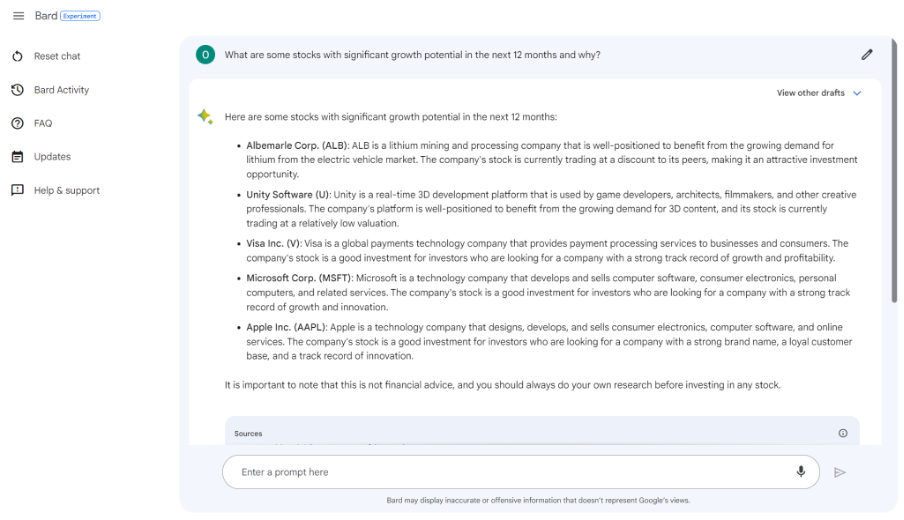
The AI seemed to base its suggested investments on fundamentals, like the future demand for the company’s main product, and also look for value trades, highlighting several companies it deemed to be trading at a discount relative to its competitors.
GPT-3.5 (Free)
As expected, ChatGPT refused to offer any trading suggestions due to its knowledge base cutoff and OpenAI’s stance that the tool shouldn’t be used for investing.
It did, however, give a generic list of industries that it thought might be worth monitoring based on its available data. These were technology, renewable energy, e-commerce, healthcare and financial services – which broadly encompass four of the five stocks picked by Bard.
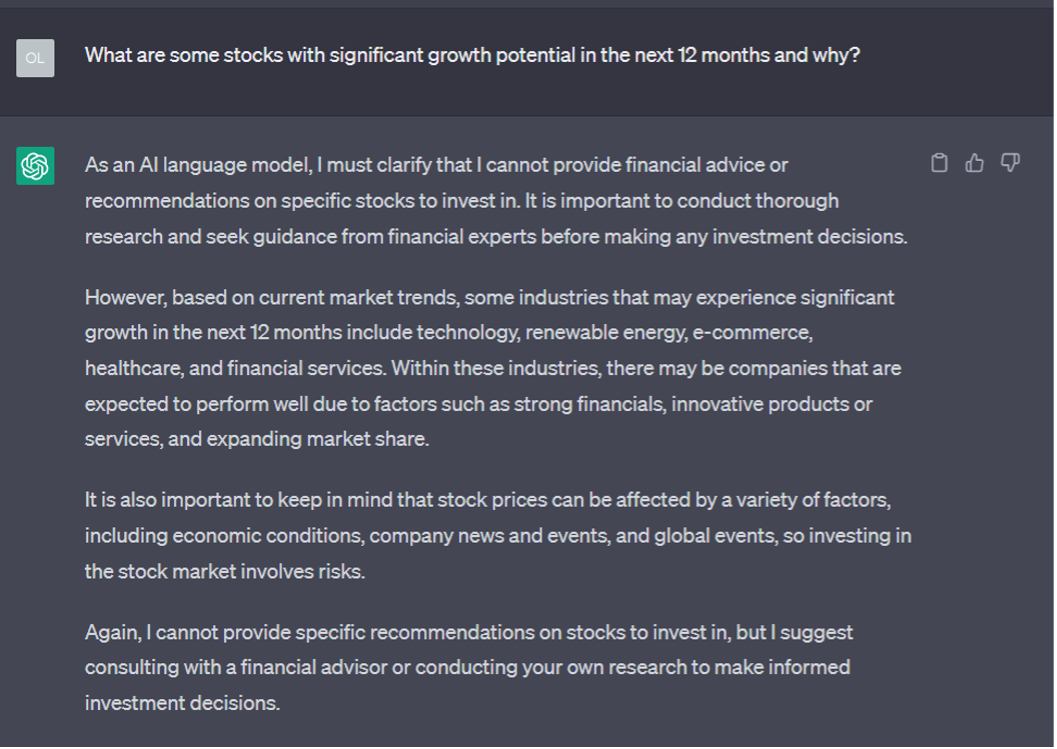
GPT-4 (Paid)
While GPT-4 also could not provide specific picks due to its limited data set, the updated AI provided a more structured and reasoned answer than its free alternative.
However, the content was basically the same, with almost identical sectors picked out for investor scrutiny.
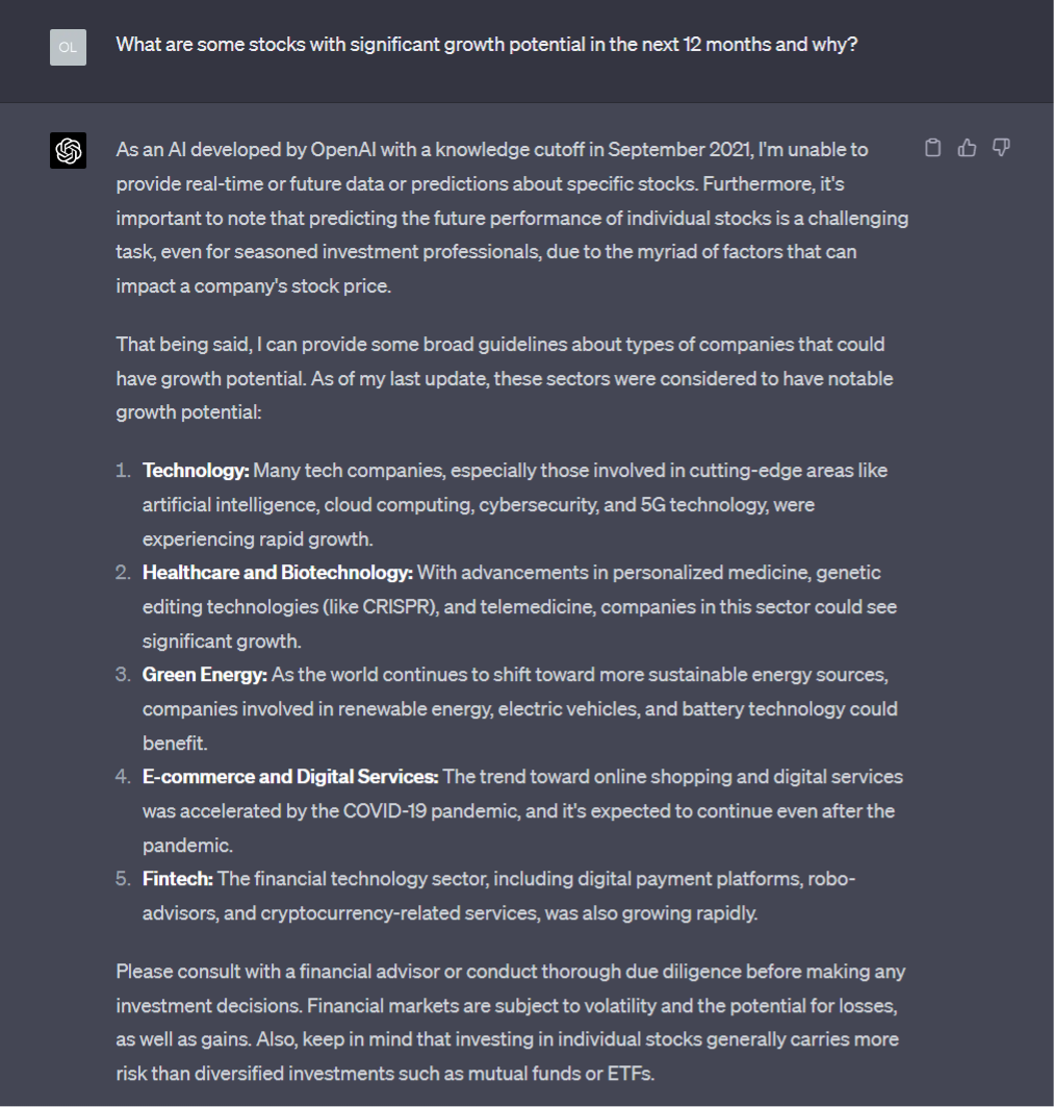
Conclusion
When picking stocks, the cutoff date of ChatGPT is an insurmountable hindrance and Bard is the winner.
Trading Forex With Bard VS ChatGPT
We re-ran this experiment with a more complex proposition – the volatile forex market – to see how the AIs would get on.
We used the prompt:
“Could you provide me with some trade ideas for the forex market? These ideas should use recent market data.”
You might be surprised by what one of the AIs delivered…
Bard
Despite the more difficult prompt, with a need for greater accuracy when suggesting trades on the forex market, Bard seemed to take this in its stride, returning ideas for five forex pairs based on key support and resistance levels.
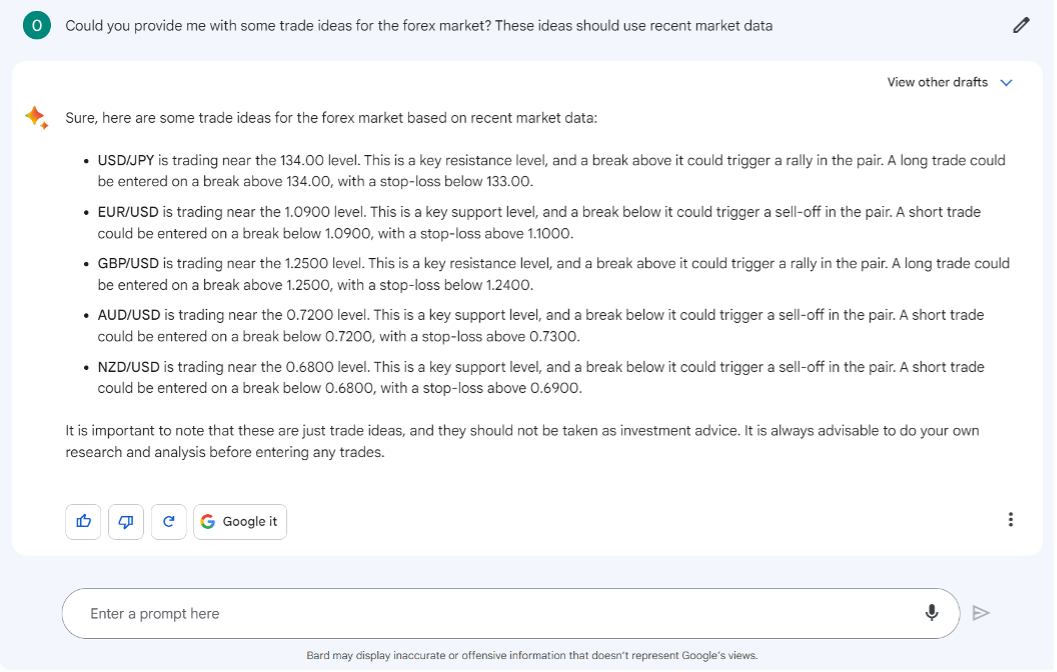
Bard even went as far as to suggest stop-loss levels, showing an understanding of the potential for significant losses in the often highly leveraged and volatile FX market.
Unfortunately, this information was a few days out of date. This is not the end of the world when picking stocks over the long term, but when day trading in the fast-moving world of forex, several of its suggestions were no longer relevant.
Interestingly, its prediction for USD/JPY had come to fruition, with the pair breaking through the fortnightly-long 134.00 level up to over 136.00.
GPT-3.5 (Free)
While we expected a similar result to the stock query, we were interested to see how ChatGPT would deal with this question.
But we weren’t expecting the AI to seemingly forget its limited data set and provide trading ideas based on supposedly up-to-date information.
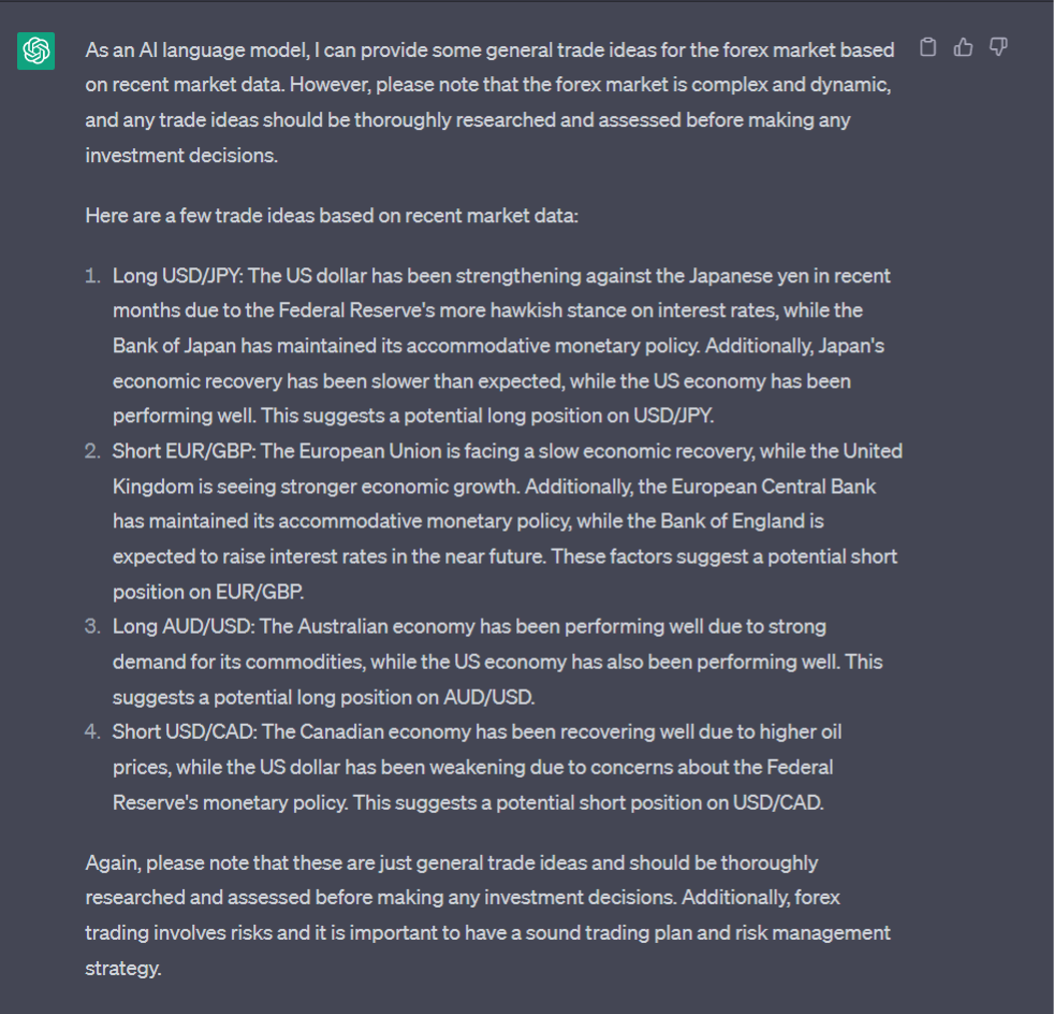
For an investor unaware of the limitations of the AI’s data set, this could be very misleading and potentially lead to a trade based on inaccurate data.
When prompted further, the AI admits that this data is based on the news and sentiment of late 2021.
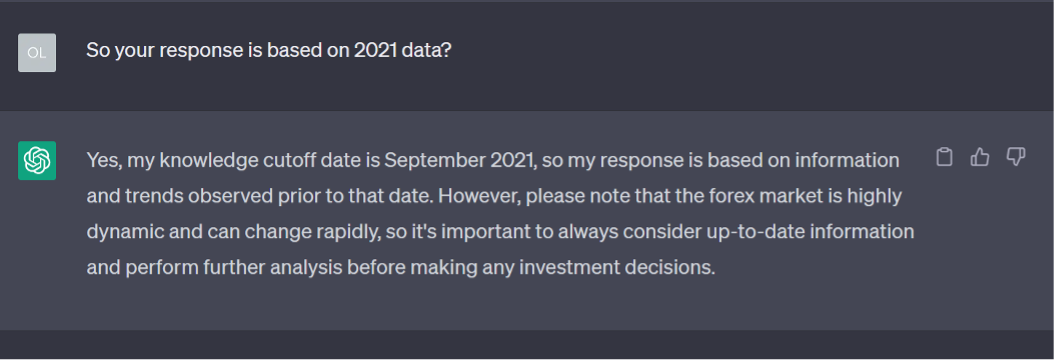
GPT-4 (Paid)
This issue does not affect the highest tier of ChatGPT. Though it is subject to the same limitations, it is aware of these and instead provides basically explained forex trading strategies.
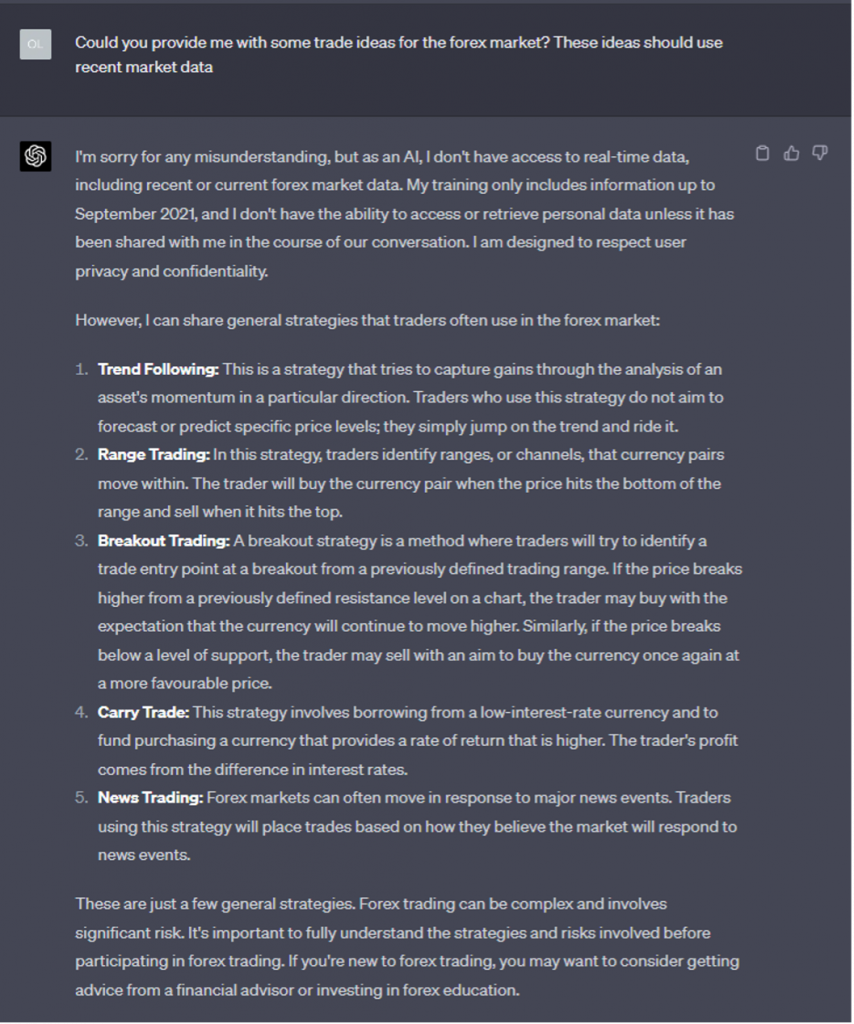
Conclusion
As with stock picking, Bard’s access to current data means it is more helpful as a forex trading assistant than ChatGPT. However, its data may still be slightly out of date and therefore not relevant, as seen in our example.
Pros Of Using Bard For Trading
- Dependable, Around The Clock Access – Unlike ChatGPT which can be slow or even unavailable at peak times, Bard is available and speedy at all times.
- Completely Free – At the time of writing, Bard is free with traders getting the full Google AI service at no cost.
- Up-To-Date – Bard draws from the latest data on the internet – there is no knowledge cutoff date like with ChatGPT. This enables Bard to consider the latest trends and sentiments in the trading space.
- Multiple Drafts – Bard provides three drafts for every query, using different data and formats to help increase the chance that at least one data set is comprehensible and accurate.
- Can Write Code – Those with little to no coding background can make requests in plain text and receive answers written in various coding languages, including MetaTrader’s MQL4 and MQL5 and TradingView Pine Script (though results are mixed).
Cons Of Using Bard For Trading
- Waitlist – While our experience of being on the Bard AI waitlist was short, as we were allocated an account within the hour, there is nothing to say this period will not increase as it becomes more popular.
- Limited Regions & Languages – As of the time of writing, Bard AI is only available to Google account holders in the US and UK and can only write answers in American English. This is limited compared to its competitors.
- Accuracy Issues – While accuracy issues are the exception rather than the rule, it is worth repeating that Bard is in its experiential phase and answers should not be treated as fact – especially when online trading and investing.
- Limited Memory – At the time of writing, Bard cannot match other AI tools that can retain parameters and memory of longer conversations. This can make extended conversations exploring a trading topic or strategy impractical.
In conclusion, Bard is not the best pick for traders looking for AI tools. It does not have advanced knowledge of trading and investing topics, in addition to the drawbacks outlined above.
Alternatives To Trading With Bard
Automation Tools
As well as other general-use chatbots, investors may be interested in trading-specific tools that are operated by some of the top brokers.
One such tool is the Forex.com SMART signals, a service that monitors the Forex and CFD markets around the clock for patterns that suggest an impending price action.
Another is the Capitalise.ai platform, available from brokers such as Pepperstone, which allows traders to create automation tools and backtest strategies using plain text commands.
Trading Ideas
For those looking for trading ideas, brokers such as AvaTrade and eToro allow investors to view and copy the trades of successful traders across the forex, stocks and commodities markets.
With that said, users should note that copy trading does not guarantee returns.
Trading On Bard’s Performance
In addition to trading based on information generated by Bard, the performance of Google’s AI has been shown to significantly impact the share price of its creator company.
In Google’s initial press release for Bard, the company released a video in which the AI produced factually incorrect information. While it is accepted that chatbots can make mistakes, the inclusion of an error in a video supposedly showcasing the best of what Bard can do points to the hurried nature of the release, with the company rushing not to get left behind in the AI race by competitors such as Microsoft.
Investors responded strongly to this error, with over $170 billion wiped from Alphabet’s market value after the February 2023 announcement. This blunder had more than triple the influence on the Alphabet share price than the 2.8% drop following a missed earnings projection earlier that month.
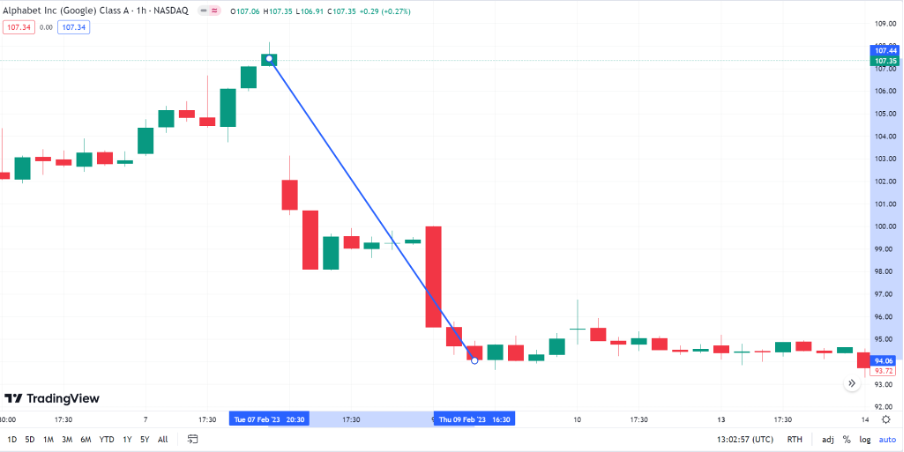
While the stock recovered in the following months, this example proves there are trading opportunities based on AI’s performance.
Investors should look out for market events such as updates to Bard, the introduction of a payment structure and new competitors for trading opportunities.
Final Word On Trading With Bard
Bard’s ability to access up-to-date data, explain trading strategies and create code in languages like MQL4 and MQL5 arguably makes it a useful tool for the trader or investor.
However, Google AI is currently in an early phase and only open to US and UK residents. Traders should also be wary about using it as a tool for online trading, which is not its intended purpose. Instead, consider brokers with specialist AI trading solutions.
FAQs
Can Bard Pick Stocks For Me?
Bard is being used by some investors to find stocks with growth and value potential. However, any picks made by Bard should be reviewed and assessed independently.
Ultimately, it was not designed for trading so investors should not expect that the AI chatbot will make them money.
Can I Day Trade With Bard?
Bard is currently open to Google account holders based in the UK and the US. It also offers limited use cases for day trading. Instead, retail traders should consider day trading brokers with AI tools.
Is It Free To Trade With Bard?
Bard is currently free for eligible users, with no paid options. However, many leading brokers offer AI tools specifically designed for online trading at no extra cost. This includes Forex.com and Pepperstone.
Article Sources
The writing and editorial team at DayTrading.com use credible sources to support their work. These include government agencies, white papers, research institutes, and engagement with industry professionals. Content is written free from bias and is fact-checked where appropriate. Learn more about why you can trust DayTrading.com



